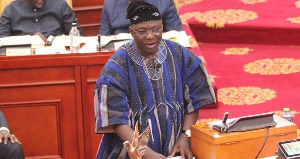 Dr Mohammed Amin Adam is a Ranking Member of Parliament’s Finance Committee
Dr Mohammed Amin Adam is a Ranking Member of Parliament’s Finance Committee
The Minority in Parliament has expressed alarm over what it describes as turbulence in Ghana’s foreign exchange (FX) market, particularly under the current administration led by President John Mahama.
Addressing the media on July 29, 2025, Ranking Member of Parliament’s Finance Committee, Dr Mohammed Amin Adam, sharply criticised the government’s handling of the cedi’s exchange rate, accusing it of lacking both transparency and a coherent strategy.
The Minority highlighted a growing disparity between official interbank exchange rates and those quoted at forex bureaus, which they say signals a scarcity of dollars in the market.
They further noted that importers are increasingly struggling to access foreign currency through commercial banks, a situation they argue is stifling trade and business operations.
Dr Amin Adam accused the Bank of Ghana of quietly injecting substantial sums into the forex market while publicly denying any such activity.
“It took the IMF to reveal that in just the first quarter of 2025, the Bank of Ghana injected over US$1.4 billion into the market. Yet these interventions are ad hoc, opaque, and lack any transparent, rule-based framework,” he said.
During the 2025 Mid-Year Budget Review on July 24, 2025, Finance Minister Dr Cassiel Ato Forson proclaimed that “cedi no apicki” (the cedi has not collapsed).
However, Dr Amin Adam dismissed this assurance as misleading, claiming that the situation on the ground tells a different story.
“Perhaps the Minister should know that ‘cedi no apicki, but Abochi get the dollar,’” he retorted.
Ghana has been grappling with an economic crisis in recent years, characterised by record-high public debt, double-digit inflation, and sharp currency depreciation.
After years of decline, including the cedi falling to around GH¢15–16 per US dollar by late 2024, the currency began a dramatic rebound in early 2025, recovering more than 42% of its value by the end of June and earning the title of the world’s best-performing currency during that period.
Foreign reserves rose from US$8.98 billion in December 2024 to approximately US$11.12 billion by June 2025, enough to cover almost five months of imports, boosted by rising gold prices, stronger export earnings, and increased remittance inflows.
Meanwhile, the IMF recently approved a US$367 million disbursement following Ghana’s completion of the fourth review of its Extended Credit Facility programme, bringing total disbursements under the current arrangement to around US$2.3 billion.
ID/MA
